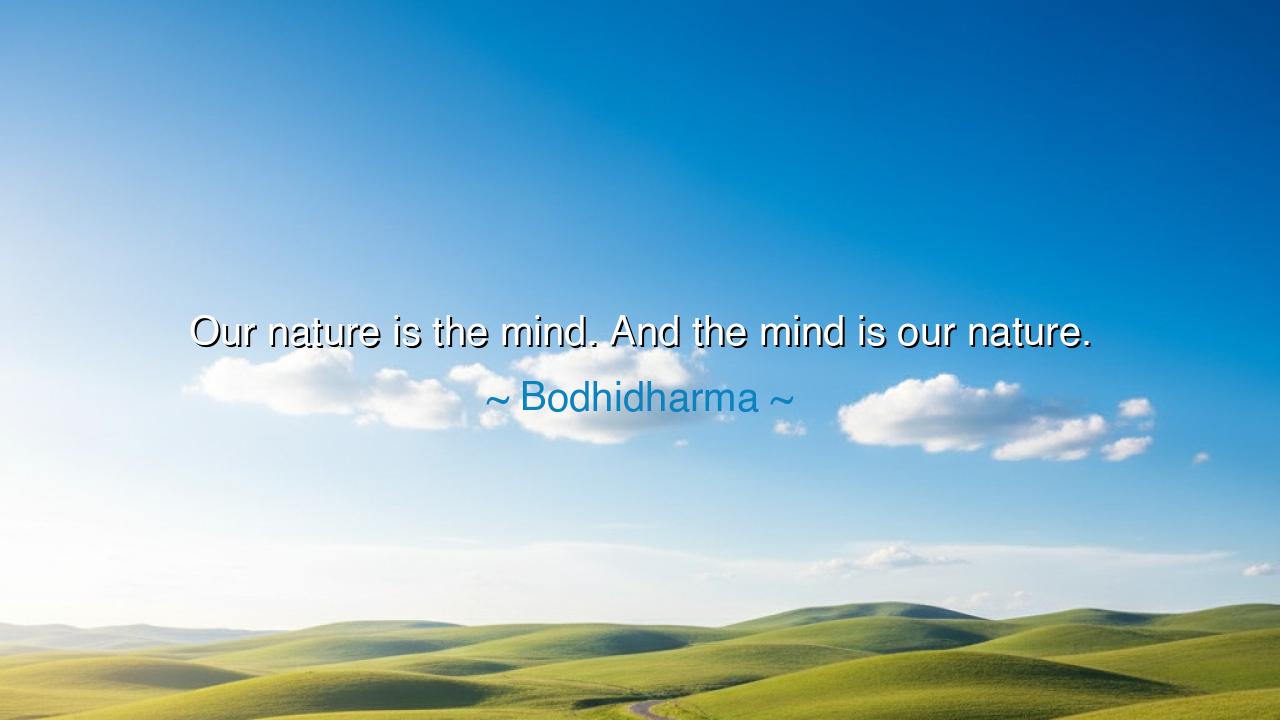
Our nature is the mind. And the mind is our nature.






Hear, O children of silence and seekers of truth, the words of Bodhidharma, the wandering sage who carried the flame of Zen from India into China: “Our nature is the mind. And the mind is our nature.” In this saying lies a teaching profound and simple, like a mountain reflected in still water. He speaks to us that what we truly are is not the body, which ages, nor the possessions, which pass, but the mind—the eternal witness, the essence of awareness, the root of our being.
For what is nature but that which defines us, the core that cannot be stripped away? And Bodhidharma declares that this nature is not outside of us, but within—the mind, the clear light that perceives. When stripped of illusions, fears, and attachments, the mind itself is revealed as pure nature. To know this is to awaken, to understand that all striving, all clinging, all wandering is unnecessary. To see one’s own mind clearly is to see one’s true self, unclouded and whole.
Consider how often men mistake themselves for what they are not. Some think their nature is their body, and so they chase beauty, power, or strength, yet in time the body betrays them. Others think their nature is their wealth or rank, and when these vanish, they are left empty. But Bodhidharma says: look deeper. The body is a vessel, the possessions are shadows, but the mind—the awareness that sees, the consciousness that is—this is the eternal core. To awaken to this truth is to stand unshaken by loss, unmoved by fear, unbroken by death.
History gives us echoes of this teaching. Marcus Aurelius, emperor of Rome, wrote in his meditations that “the soul becomes dyed with the color of its thoughts.” Though he commanded armies and governed empires, he knew his true self was not throne nor crown, but the quality of his mind. Likewise, the Buddha himself, sitting beneath the Bodhi tree, saw that suffering arises from the mind’s clinging, and liberation comes from the mind’s awakening. Both emperor and sage arrived at the same truth: that to master the mind is to master the self.
This teaching also explains the discipline of the monks of Shaolin, whom legend ties to Bodhidharma himself. They trained their bodies through hardship, but always their true training was in mindfulness—discipline of thought, clarity of awareness, stillness of spirit. For though the body may strike, leap, and endure, the body without the mind is an empty shell. Their art was not of fists alone but of mind governing body, nature revealed through awareness.
The lesson is clear: to know your true nature, you must turn inward. Do not be deceived by outward identity, for these are temporary garments. Your essence is the mind, the living awareness that shapes your reality. To neglect it is to wander blindly; to train it is to awaken. Guard your thoughts, sharpen your awareness, and seek silence, for in silence the nature of the mind shines clear.
Practical wisdom follows: set aside moments each day to still the noise and look inward. Meditate, breathe, observe your thoughts without clinging to them. Let go of the illusion that your worth is in what you possess, or even what you appear to be. Instead, cultivate the garden of the mind, planting seeds of compassion, clarity, and wisdom. For when your mind is at peace, your nature is revealed, and nothing can shake you.
Thus, O children of tomorrow, remember Bodhidharma’s words: “Our nature is the mind. And the mind is our nature.” Do not look outward for what you already possess within. The path to freedom is not in chasing shadows, but in realizing the light that already burns in you. Know your mind, and you will know your nature; know your nature, and you will know eternity.






AAdministratorAdministrator
Welcome, honored guests. Please leave a comment, we will respond soon